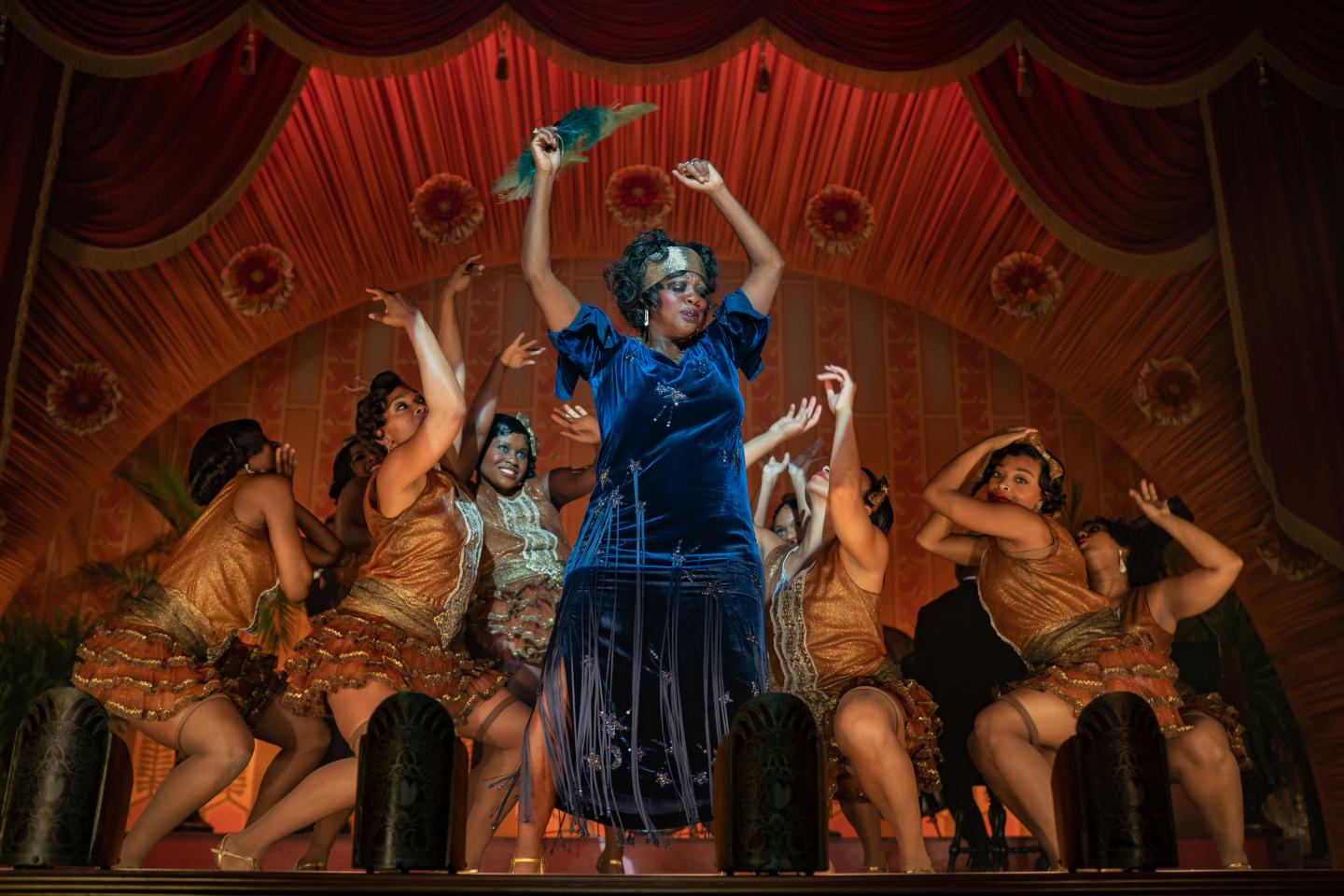Movie Info
Movie Info
- Director
- George C. Wolfe
- Run Time
- 1 hour and 34 minutes
- Rating
- R
VP Content Ratings
- Violence
- 4/10
- Language
- 3/10
- Sex & Nudity
- 4/10
- Star Rating
Relevant Quotes
Their mouths are filled with cursing and deceit and oppression; under their tongues are mischief and iniquity.
Their mouths are filled with cursing and deceit and oppression; under their tongues are mischief and iniquity.
We are afflicted in every way, but not crushed; perplexed, but not driven to despair; persecuted, but not forsaken; struck down, but not destroyed

This is the third film made from an August Wilson play, this adaptation by Ruben Santiago-Hudson and directed by George C. Wolfe. Denzel Washington, who in 2016 directed and starred in Fences, remains behind the camera this time as executive producer, but his co-star Viola Davis is very much front and center as the title character, a real life Blues singer, one of the first Black women to cut a record in the early 20th Century. The film is also outstanding because not only does her co-star Chadwick Boseman rise to her superb level of performance, it will forever be known as his last screen appearance. Even setting aside the film’s social significance, this is a film not to be missed!
Of the ten plays that make up what is called the Pittsburgh Cycle, this is the only tale set outside the steel industry city. It begins at night in a Georgia woods wherein streams of Blacks carrying torches to light their way converge on a large tent, the sign at the entrance advertising “Ma Rainey.” Claiming the title of “Mother of the Blues,” the middle-aged singer, her face decorated (I am tempted to write desecrated) by grease paint make-up, belts out her signature song as she bumps and grinds her hips, and of course, her ample black bottom, to the delight of the audience. The song itself is named for a dance popular with Black audiences at the time, the 1920s. We also see Rainey on a theater stage in an even more elaborate rendition. This sets us up for her appointment at a seedy Chicago recording studio in 1927. The playwright’s fictional account of her recording of the song changes, for dramatic effects, the season from winter to one of those sweltery summer days Chicago is infamous for. DP Tobias Schliessler’s camera and lighting capture well the color of a hot day in the city.
Ma’s White manager Irvin (Jeremy Shamos) and studio owner Sturdyvant (Jonny Coyne) are impatiently awaiting Ma’s arrival, but it is the band members who arrive at the 1 PM appointed time, Toledo (Glynn Turman), Cutler (Colman Domingo), and Slow Drag (Michael Potts). Then comes the youngest member, trumpeter Levee (Chadwick Boseman) who has a greater ambition than being a sideman. Along the way he has bought a showy pair of yellow Oxfords and flirted with any girl within eyesight. He has jazzed up Ma’s song and convinced Irv that his version will be the one recorded that day. As Levee boasts about his skills the men argue, the older ones knowing Ma is not about to yield to a hired hand. Earlier, we had seen Levee stealing the spotlight during on of Ma’s stage shows and Ma, glaring at him with disapproval, imperiously beckoning the light man to refocus on her.

Ma finally does arrive, though the recording is delayed while Irv bribes a White cop to overlook a traffic infraction involving a minor collision of Ma’s new car with that of another driver. Ma is accompanied by her nephew Sylvester (Dusan Brown) and the curvaceous Dussie Mae (Taylour Paige) clad in a tight dress whom we soon see is more than just a companion. There is more than a hint of sexual relationship in one shot where the older woman embraces and fondles the girl, echoing Ma’s song “Prove It On Me” with the verse, “they said I do it, ain’t nobody caught me./Sure got to prove it on me./Went out last night with a crowd of my friends./They must’ve been women, ’cause I don’t like no men.” Clearly, Ma, is no submissive conformist, either sexually or racially. She soon over-rides her trumpeter, even though he claims his version is the popular one because younger folk can dance to it.
Ma also asserts her authority over the Whites. Irv had forgotten to order the three Coca-Colas she had demanded. Also, she had promised to look after Sylvester and help him make some money, so she insists that he record a two-line introduction to her song. Even the band is against this because of his stuttering. So, the recording is held up until Ma’s Cokes arrive, and then, at her insistence, a second microphone is brought down for the boy and he stumbles his way until at last by the sixth or seventh take he gets his lines right.
We are not very far into the film before it is evident that the theme of power is as strongly explored as that of race. Irv and Sturdyvant might stand at the pinnacle of power in racist America, but Ma fights back, using what leverage she has, which is her voice that the pair want in order to make money from it. She is shrewd enough to know this, and so several times when they try to bend her to their will, she threatens to go back to Georgia where her fans support her. Ma says that the solicitous Irv doesn’t really care about her. “All they care about is my voice.” She also has a few lines that let us in on the secret of the blues, popular even among whites. Speaking of her blues singing, she says, “They hear it come out, but they don’t know how it got there.”
But we are privileged to learn “how it (the blues) got there” in some of the talk among the band members. In a delightful monologue using food and cooking as symbols for the plight of Black people in America Toledo declares that after the meal is consumed, “The colored man, he’s the leftovers.” We discover the pain and bitterness behind Levee’s rebelliousness when he responds to the men’s taunts that he is playing up to the the White men in the studio booth in an attempt to get his own music recorded. He shares with the men the story from his boyhood of his mother being raped by a group of Whites while his powerless father could only look on, but then with the patience of Job, waited for a long time until he could exact his revenge. Raging against Cutler’s strong faith, Levee demands to know where was God during that horrible event. Pointing his knife at the sky, he yells, “Did you turn your back on me?” More than once he taunts God to strike him down if he is real. It’s a scene that brought back to me the powerful one in Cool Hand Luke during a thunderstorm in which the agnostic prisoner Luke stares up at the lightning-pierced sky while his fellow prisoners cower in terror and Luke taunts God to strike him down.
Levee is as talented as he is rebellious, working on one of his songs when he should have been rehearsing with the band. He is also naïve, thinking that his future lies with Irv to whom he has entrusted several songs when promised studio time for recording them with a band of his own choice. Worse, Levee is impetuous, cursed with a bad temper that easily flares out of control. This will lead to a shocking tragedy that I think Wilson wants us to understand is a perpetual, long-time curse for Black males forced to exist at the fringe of racist America.
Brightening the darkness of the film is the music, four songs by Ma Rainey, “Deep Moaning Blues,” “ Hear Me Talking to You,” “Those Dogs of Mine,” and “Ma Rainey’s Black Bottom,” along with a couple of other songs, all produced by music director Branford Marsalis. Through Ma Rainey’s words and action, we see that the Blues is one means by which racist-afflicted Blacks keep despair and darkness at bay. “Blues help you get out of bed in the morning,” Ma says. Yes, life can be tough, rotten, with a lover betraying you and the Man afflicting you, but you can, and will, survive! And for strong women like Ma, the Blues is also defiance, a way of fighting back, of asserting her limited power and maintaining her dignity.
But in the Twenties when the gains of the Civil Rights era were almost unthinkable, White racism held sway, and we see this in the final scene, which is a creative stroke of genius on Wilson’s part. It is an ending similar to that of the finale of a film reviewed here a few months ago, 1947’s New Orleans. Only in the earlier film, made by clueless Whites, the ending was seen as positive, marking the advance of jazz from a small audience in the Southern City to a large audience in New York City where culture snobs had to yield to its power and beauty. Wilson’s ending sees the scene as the tragedy it was and would be until the Sixties when Blacks began to produce their own music. As mentioned earlier, Levee had given several of his songs to Irv in the hope he could record them with his own band, but when pressed, Irv says No. He pretends to be generous by offering to buy them—for $5 apiece! In the film’s last scene, guess who records Levees songs? Thus, the talented young musician undergoes two tragedies in this powerful and perceptive film.
One sequence of action shows Wilson’s genius takes place in the dingy rehearsal basement room that the White owner seems to have set aside intentionally to show “the coloreds” their place. Levee feels hemmed in, often going to the barred exit door to try to open the door. It always resists opening until after numerous tries it yields when he is alone. Pulling it open, he walks through it, finding himself in an air shaft. It is a door leading to nowhere, a foretaste of what awaits him later in the story.
There ought to be at least three Oscars given to this provocative film. Along with “Best Film” (or at least “Best Adapted Screenplay”) Viola Davis deserves a second Best Actress award, so fiercely does she merge into the role of a woman refusing to let either sexist males or racist society deny her the dignity and the rewards justly due her talents. She takes over the screen whenever she shows up. And holding his own opposite her is the star who brought acclaim and stature to the Black hero T’Challa in Marvel Film’s Black Panther, a film that has become a cultural phenomenon. His portrayal of the tortured son of a raped woman who cannot escape his past or obtain the rewards due his talent is one you will remember as long as you live. He makes this film center on two, not just one Black artist. These two great actors, supported by an also talented caste, grant us the privilege of sitting in on conversations closed to outsiders. We experience, as much as we can vicariously, the shame and pain of living in a society that rewards some and punishes others solely on the basis of the color of their skin.
I have read that Washington intends to adapt all ten of Wilson’s plays. I can hardly wait to see the others. The late August Wilson’s is a voice that needs to be preserved and shared by all Americans, Black and White. He is as scathing, and as insightful, as James Baldwin.
This review will be in the January y issue of VP along with a set of questions for reflection and/or discussion. If you have found reviews on this site helpful, please consider purchasing a subscription or individual issue in The Store.


Wonderful and helpful review, Ed. Many thanks.
Thanks, Bernie. It’s reassuring to receive such feedback. Thank you.